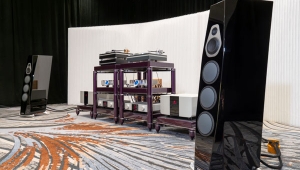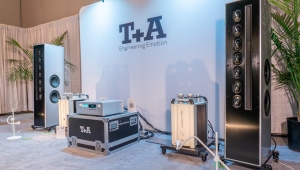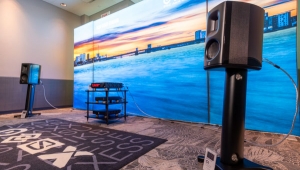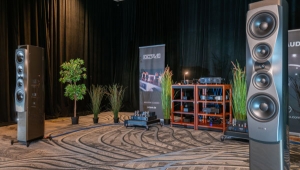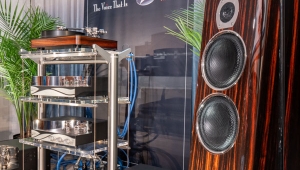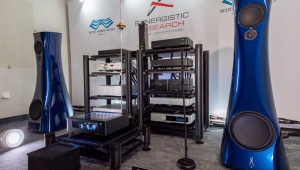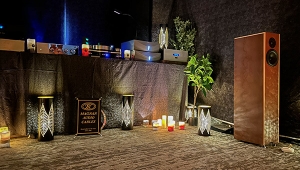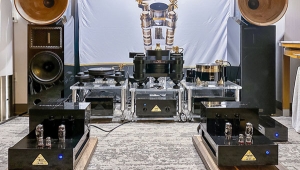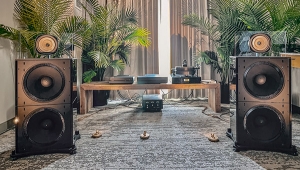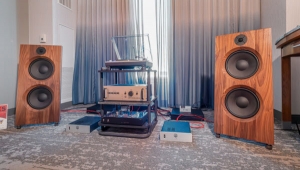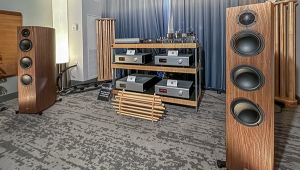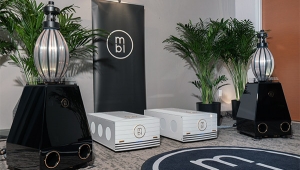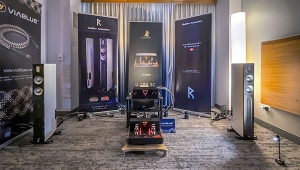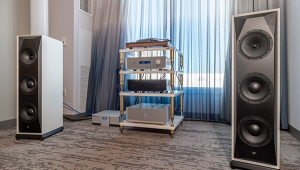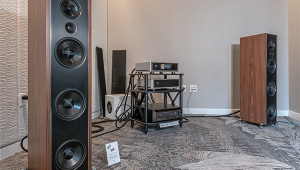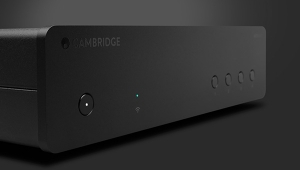| Columns Retired Columns & Blogs |
Rutherford Audio: Stratton Acoustics, Accustic Arts, Vertere, Analog Signature, Antipodes, Solid Tech

In Schaumburg C, Rutherford Audio set up camp—and what a camp it was! Electronics by Accustic Arts, analog by Acoustic Signature and Vertere—two turntables—and loudspeakers by Stratton Acoustics, a speaker line I had not previously heard.
The room was notably populated with distinguished folks—the owners of Acoustic Signature and Accustic Arts (Robert Hagemann and Jochen Voss, respectively) were in attendance, as was Rutherford Audio head Robb Neimann.
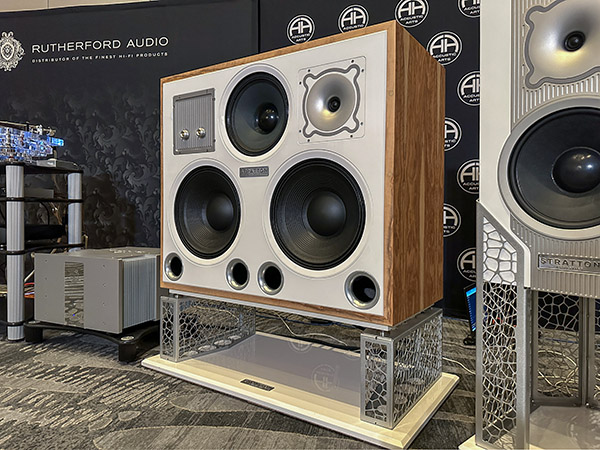
With big music streaming from an Antipodes Oladra ($29,000) utilizing the DAC in an Accustic Arts Power V integrated amplifier (using the Bypass output), feeding an Accustic Arts Tube Pre V ($28,500) and on to the big AA Mono VI power amplifiers ($90,000/pair).
The Mono VI amps were supplying the smallest (but still large) of two pairs of loudspeakers, the Stratton Acoustics 12 ($55,000), spaced widely in this big, high-ceilinged room. Racks (Radius Solo 4, $2599) and amp stands (Radius Solo 1, $1099 each) were by Solid Tech. Behind the main rack was one of the coolest power strips I’ve seen, with AC phase inversion for those AC-phase–related emergencies, by Vertere. It’s pricey though, at $18,995 including an HB power cord.
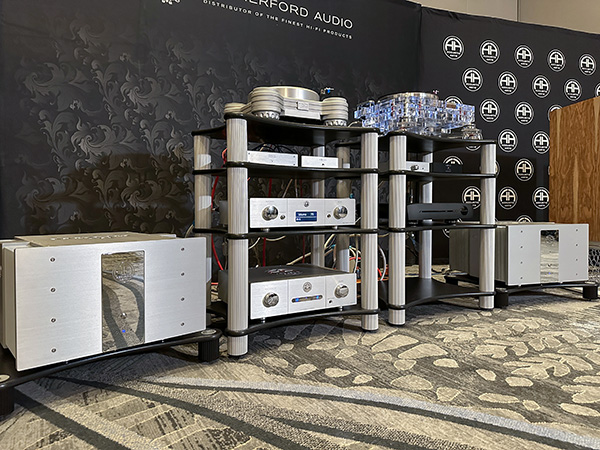
My first impression was, this soundstage is vast. But I was eager to hear the big Strattons, so I asked when they would be in the system. This afternoon, I learned. What’s more, at 1pm, vinyl would be spun. I made plans to return.
And when I did, the big speakers—the Stratton Acoustics Elypsis 1512s ($165,000/pair)—were indeed in the system, and the music (an album by Seal) was being read from PVC discs spun on the Vertere 'table (an RG1, $39,995) with the Vertere Reference tonearm ($64,995!) and Vertere Xtrax cartridge ($6499). Now, in addition to the vast soundstage, what stood out was the bass impact—including in the literal sense of powerful pressure waves hitting the chest. What most caught my attention, though, was the vocals, which were earthy, distinct, full of color and character, just a little bit behind the most forward part of the stage. To say that, though, misses the main point, which is that they somehow surprised me.
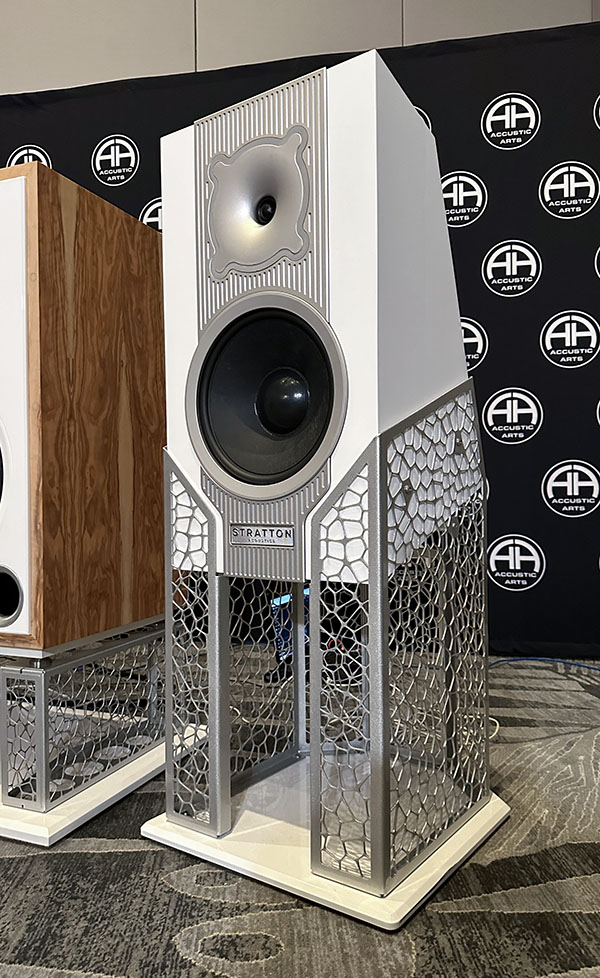
Then Robb Neiman replaced the LP with an acetate of the same disc. This was a new experience for me—a direct comparison of an album and an acetate. Clarity and impact were raised by, what, 20%? 30%? How does one quantify such things?
What struck me this time, though, was the background vocals—an experience similar to what I previously heard with the lead vocal. I’m not sure how to describe it other than to say—again—that they surprised me, why, I'm not sure. Perhaps it was their deep separation, in terms of both space and timbre, from everything else that was happening musically (which was a lot). This kind of surprise—when what you hear is not what you expect to hear—is for me one of hi-fi’s greatest rewards.
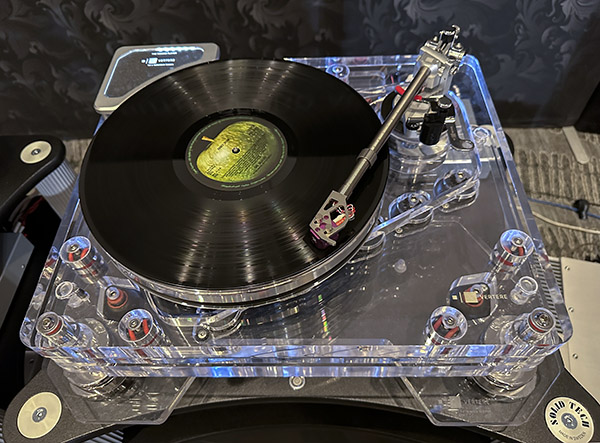
I had an appointment and had to leave. But on my way out, I asked when the Acoustic Signature turntable, the Montana NEO, would be playing ($33,995 plus $7895 for the 9" TA-5000 tonearm and $3599 for the Vertere Mystic cartridge). I wanted to hear it, too. They told me that at 5pm, they’d play whatever I wanted.
When I returned at about 5:10, The Vertere was still on, but Robb quickly switched to the Acoustic Signature. Asked if I had any requests, I went to the LP file (two large bags) and pulled out two LPs. The first was Lee Morgan, Search for the New Land. I’m not sure which issue it was; it was gatefold, so probably not the recent Blue Note Classic Vinyl.
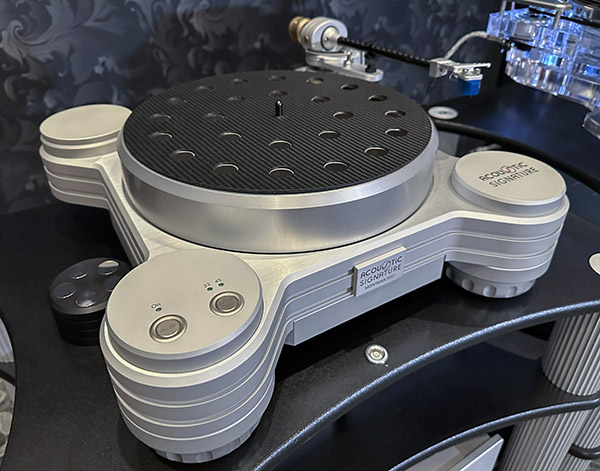
This is a familiar record, and it sounded about as I know it, just wider and deeper.
The next album I requested was Deep Purple, Machine Head. Not the recent Dweezil remix but an original or early reissue. Robb asked me for volume prompts, and I pointed upward until it was quite loud.
Some musical experiences are subtle; others are like a deep-tissue massage. Deep Purple via this big system was the latter. I remarked as "Smoke on the Water" ended that if someone had a heart attack, you could prop them up in front of these speakers and the bass energy hitting them in the chest would revive them.
Cabling was by Vertere: Pulse HB-S mains cables ($8000 each) and HB interconnects ($9995 each), speaker cables ($17,950/pair) and USB cable ($2950.)
- Log in or register to post comments
